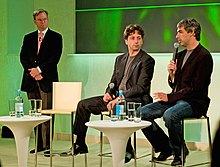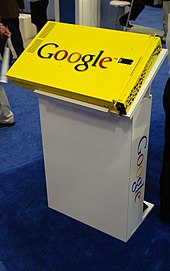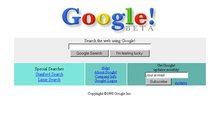Google is known for having an informal corporate culture. On Fortune magazine's list of best companies to work for, Google ranked first in 2007 and 2008 and fourth in 2009 and 2010. Google was also nominated in 2010 to be the world’s most attractive employer to graduating students in the Universum Communications talent attraction index. Google's corporate philosophy embodies such casual principles as "you can make money without doing evil," "you can be serious without a suit," and "work should be challenging and the challenge should be fun."
Employees

New employees are called "Nooglers," and are given a propeller beanie hat to wear at their first TGIF.
In 2007 and through early 2008, Google has seen the departure of several top executives. In October 2007, former chief financial officer of YouTube Gideon Yu joined Facebook along with Benjamin Ling, a high-ranking engineer. In March 2008, Sheryl Sandburg, then vice-president of global online sales and operations, began her position as chief operating officer of Facebook while Ash ElDifrawi, formerly head of brand advertising, left to become chief marketing officer of Netshops, an online retail company that was renamed Hayneedle in 2009. In January 2011, Google announced that on April 4 Larry Page would become CEO and Eric Schmidt will become Executive Chairman.
As a motivation technique, Google uses a policy often called Innovation Time Off, where Google engineers are encouraged to spend 20% of their work time on projects that interest them. Some of Google's newer services, such as Gmail, Google News, Orkut, and AdSense originated from these independent endeavors. In a talk at Stanford University, Marissa Mayer, Google's Vice President of Search Products and User Experience, showed that half of all new product launches at the time had originated from the Innovation Time Off.
Googleplex

The Googleplex, Google's original and largest corporate campus
Main article: Googleplex
Google's headquarters in Mountain View, California is referred to as "the Googleplex", a play on words on the number googolplex and the headquarters itself being a complex of buildings. The lobby is decorated with a piano, lava lamps, old server clusters, and a projection of search queries on the wall. The hallways are full of exercise balls and bicycles. Each employee has access to the corporate recreation center. Recreational amenities are scattered throughout the campus and include a workout room with weights and rowing machines, locker rooms, washers and dryers, a massage room, assorted video games, table football, a baby grand piano, a pool table, and ping pong. In addition to the rec room, there are snack rooms stocked with various foods and drinks. In 2006, Google moved into 311,000 square feet (28,900 m2) of office space in New York City, at 111 Eighth Ave. in Manhattan. The office was specially designed and built for Google, and it now houses its largest advertising sales team, which has been instrumental in securing large partnerships. In 2003, they added an engineering staff in New York City, which has been responsible for more than 100 engineering projects, including Google Maps, Google Spreadsheets, and others. It is estimated that the building costs Google $10 million per year to rent and is similar in design and functionality to its Mountain View headquarters, including table football, air hockey, and ping-pong tables, as well as a video game area. In November 2006, Google opened offices on Carnegie Mellon's campus in Pittsburgh, focusing on shopping related advertisement coding and smartphone applications and programs. By late 2006, Google also established a new headquarters for its AdWords division in Ann Arbor, Michigan. Furthermore, Google has offices all around the world, and in the United States, including Atlanta, Austin, Boulder, San Francisco, Seattle, and Washington DC.Google is taking steps to ensure that their operations are environmentally sound. In October 2006, the company announced plans to install thousands of solar panels to provide up to 1.6 megawatts of electricity, enough to satisfy approximately 30% of the campus' energy needs. The system will be the largest solar power system constructed on a U.S. corporate campus and one of the largest on any corporate site in the world. In addition, Google announced in 2009 that it was deploying herds of goats to keep grassland around the Googleplex short, helping to prevent the threat from seasonal bush fires while also reducing the carbon footprint of mowing the extensive grounds. The idea of trimming lawns using goats originated from R. J. Widlar, an engineer who worked for National Semiconductor. Despite this, Google has faced accusations in Harper's Magazine of being extremely excessive with their energy usage, and were accused of employing their "Don't be evil" motto as well as their very public energy saving campaigns as means of trying to cover up or make up for the massive amounts of energy their servers actually require.
Easter eggs and April Fools' Day jokes
Google has a tradition of creating April Fools' Day jokes. For example, Google MentalPlex allegedly featured the use of mental power to search the web. In 2007, Google announced a free Internet service called TiSP, or Toilet Internet Service Provider, where one obtained a connection by flushing one end of a fiber-optic cable down their toilet. Also in 2007, Google's Gmail page displayed an announcement for Gmail Paper, allowing users to have email messages printed and shipped to them. In 2010, Google jokingly changed its company name to Topeka in honor of Topeka, Kansas, whose mayor actually changed the city's name to Google for a short amount of time in an attempt to sway Google's decision in its new Google Fiber Project.In addition to April Fools' Day jokes, Google's services contain a number of Easter eggs. For instance, Google included the Swedish Chef's "Bork bork bork," Pig Latin, "Hacker" or leetspeak, Elmer Fudd, and Klingon as language selections for its search engine. In addition, the search engine calculator provides the Answer to the Ultimate Question of Life, the Universe, and Everything from Douglas Adams' The Hitchhiker's Guide to the Galaxy. Furthermore, when searching the word "recursion", the spell-checker's result for the properly spelled word is exactly the same word, creating a recursive link. Likewise, when searching for the word "anagram," meaning a rearrangement of letters from one word to form other valid words, Google's suggestion feature displays "Did you mean: nag a ram?" In Google Maps, searching for directions between places separated by large bodies of water, such as Los Angeles and Tokyo, results in instructions to "kayak across the Pacific Ocean." During FIFA World Cup 2010, search queries like "World Cup", "FIFA", etc. will cause the "Goooo...gle" page indicator at the bottom of every result page to read "Goooo...al!" instead.
Philanthropy
In 2004, Google formed the not-for-profit philanthropic Google.org, with a start-up fund of $1 billion. The mission of the organization is to create awareness about climate change, global public health, and global poverty. One of its first projects was to develop a viable plug-in hybrid electric vehicle that can attain 100 miles per gallon. Google hired Dr. Larry Brilliant as the program's executive director in 2004 and the current director is Megan Smith.In 2008 Google announced its "project 10100" which accepted ideas for how to help the community and then allowed Google users to vote on their favorites. After two years of silence, during which many wondered what had happened to the program, Google revealed the winners of the project, giving a total of ten million dollars to various ideas ranging from non-profit organizations that promote education to a website that intends to make all legal documents public and online.
In 2011, Google donated 1 million euros to International Mathematical Olympiad for to support the next five annual International Mathematical Olympiads (2011-2015).
Network neutrality
Google is a noted supporter of network neutrality. According to Google's Guide to Net Neutrality:Network neutrality is the principle that Internet users should be in control of what content they view and what applications they use on the Internet. The Internet has operated according to this neutrality principle since its earliest days... Fundamentally, net neutrality is about equal access to the Internet. In our view, the broadband carriers should not be permitted to use their market power to discriminate against competing applications or content. Just as telephone companies are not permitted to tell consumers who they can call or what they can say, broadband carriers should not be allowed to use their market power to control activity online.On February 7, 2006, Vint Cerf, a co-inventor of the Internet Protocol (IP), and current Vice President and "Chief Internet Evangelist" at Google, in testimony before Congress, said, "allowing broadband carriers to control what people see and do online would fundamentally undermine the principles that have made the Internet such a success."
Privacy
Eric Schmidt, Google’s chief executive, said 2007 in an interview with the Financial Times: "The goal is to enable Google users to be able to ask the question such as ‘What shall I do tomorrow?’ and ‘What job shall I take?'". Schmidt reaffirmed this 2010 in an interview with the Wall Street Journal: "I actually think most people don't want Google to answer their questions, they want Google to tell them what they should be doing next."On December 2009, Google's CEO, Eric Schmidt, declared after privacy concerns: "If you have something that you don't want anyone to know, maybe you shouldn't be doing it in the first place. If you really need that kind of privacy, the reality is that search engines — including Google — do retain this information for some time and it's important, for example, that we are all subject in the United States to the Patriot Act and it is possible that all that information could be made available to the authorities." Privacy International ranked Google as "Hostile to Privacy", its lowest rating on their report, making Google the only company in the list to receive that ranking.
At the Techonomy conference in 2010 Eric Schmidt predicted that "true transparency and no anonymity" is the way forward for the internet: "In a world of asynchronous threats it is too dangerous for there not to be some way to identify you. We need a [verified] name service for people. Governments will demand it." He also said that "If I look at enough of your messaging and your location, and use artificial intelligence, we can predict where you are going to go. Show us 14 photos of yourself and we can identify who you are. You think you don't have 14 photos of yourself on the internet? You've got Facebook photos!"
The non-profit group Public Information Research launched Google Watch, a website advertised as "a look at Google's monopoly, algorithms, and privacy issues." The site raised questions relating to Google's storage of cookies, which in 2007 had a life span of more than 32 years and incorporated a unique ID that enabled creation of a user data log. Google's has also faced criticism with its release of Google Buzz, Google's version of social networking, where Gmail users had their contact lists automatically made public unless they opted out. Google has been criticized for its censorship of certain sites in specific countries and regions. Until March 2010, Google adhered to the Internet censorship policies of China, enforced by means of filters known colloquially as "The Great Firewall of China". There were reports in 2010 from leaked diplomatic cables that the Chinese Politburo had hacked into Google's computers as part of a worldwide coordinated campaign of computer sabotage carried out by "government operatives, private security experts and Internet outlaws recruited by the Chinese government."
Despite being highly influential in local and national public policy, Google does not disclose its political spending online. In August of 2010, New York City Public Advocate Bill de Blasio launched a national campaign urging the corporation to disclose all of its political spending.
During 2006-2010 Google Streetview camera cars collected about 600 gigabytes of data from users of unencrypted public and private Wi-Fi networks in more than 30 countries. No disclosures nor privacy policy was given to those affected, nor to the owners of the Wi-Fi stations. A Google representative claimed that they were not aware of their own data collection activities until an inquiry from German regulators was received, and that none of this data was used in Google's search engine or other services. A representative of Consumer Watchdog replied, "Once again, Google has demonstrated a lack of concern for privacy. Its computer engineers run amok, push the envelope and gather whatever data they can until their fingers are caught in the cookie jar." In a sign that legal penalties may result, Google said it will not destroy the data until permitted by regulators.







